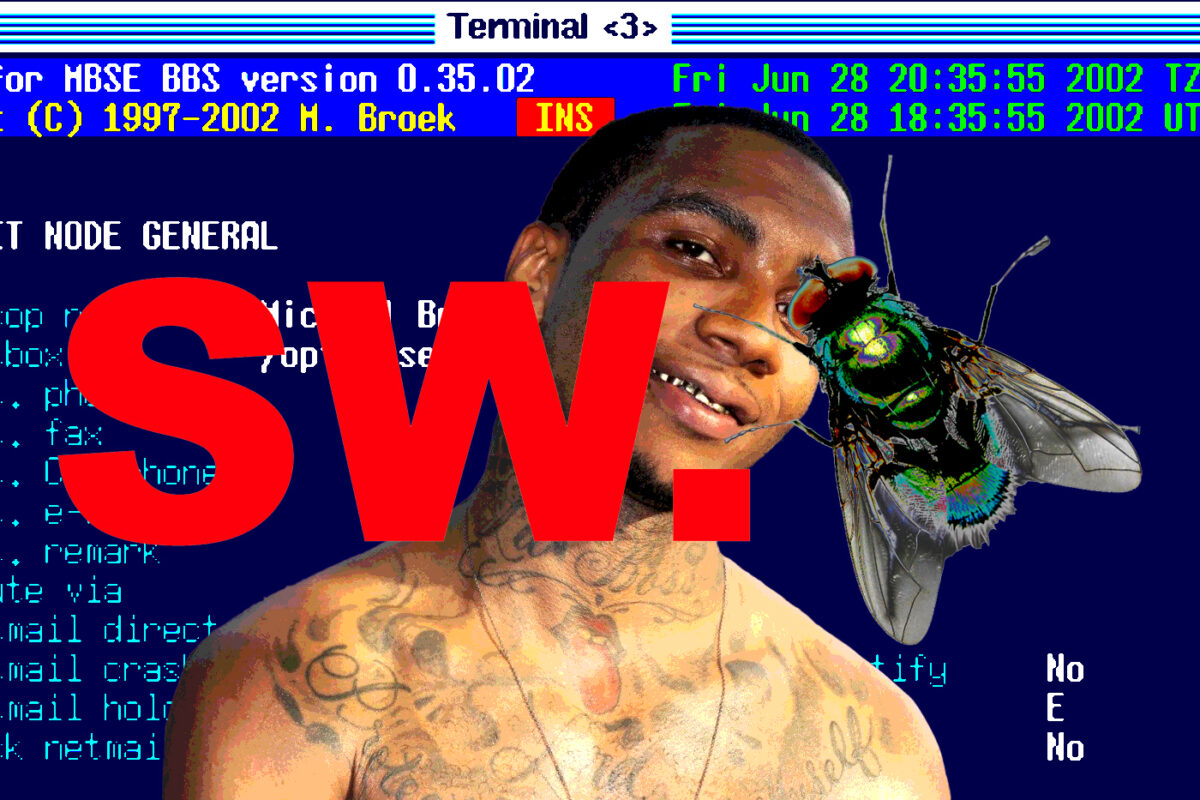DISCLAIMER: I got a 77% on this, sent a strongly worded email in refutation, and got it dropped to a 73%. It could be better, and I’d like to rewrite this one day with a larger lens than just music, but the prompt held me to music. I hope this is better than a 73%, or this disclaimer will look dumb. I just urge you to not take MUSL 1600-01 American Popular Music.
ARI PARTRICH
By 2008, hip-hop found itself at a crossroads. The Bling Era—a generative stretch fronted by the Dungeon Family and then controlled by record labels like Michael Watts’ Swishahouse, Birdman’s Cash Money, and Cam’ron’s Diplomat throughout the 2000s—had dismantled an intense, war-like (but, by the turn of the millennium, conventional) East Coast versus West Coast skeleton brought on by the 1990s. What replaced this structure was an epoch marked by smooth R&B hooks and 80s-borne samples, most of which droned behind exaggeratedly materialistic lyricism. But this nascent era of an old-world relic like rap, much like any other industry in the technological road-fork of the mid-2000s, also needed to adjust to the looming presence of a tricky thing called the internet.
While traditional hip-hop sales fell during this transition, local Bling scenes—such as the booming 808s of Snap in Atlanta, and the unorthodox flows of Hyphy in the San Francisco Bay—garnered cult followings. These scenes bred ideal climates for two internet-savvy MCs, Soulja Boy from Atlanta and Lil B from the Bay, to utilize young apps like MySpace, Twitter, and YouTube to permanently expand the possibilities for independent artists who, like themselves, increasingly sought means of gaining rapport beyond bootleg CDs and car-trunk retail.
“Think about it in my shoes. This time last year I was poor as fuck. I was in the ghetto. N—, I worked to get this—I’m 17 years old! You should be congratulating me!”
📡📡📡
Soulja Boy, born DeAndre Way, began releasing music in 2007, and quickly stormed hip-hop’s upper echelons off the success of his viral single “Crank That.” Although Interscope Records is the label that eventually made the track reach #1 on the Billboard Hot 100, it was, at the onset, Soulja Boy’s relentless guerilla marketing scheme that positioned him to be signed by a label in the first place. Posting tutorials to “Crank That”’s corresponding dance on YouTube, then vehemently promoting the song on MySpace and Twitter, he reached a generative target audience of young listeners poised to champion a new era. A ruthless social media presence that featured near-weekly drops, unashamed self-promotion, communication with fans, and publicly-sought collaborators would become the definitive framework for rising independent artists throughout the 2010s—and into present day—for gaining traction with major labels who were slowly beginning to catch on.
Sonically speaking, Soulja Boy remains, in retrospect, a very controversial figure. His ability to compress a Snap song into a string of catchy, repetitive hooks that overshadowed the brevity of his lyrical content would come to be known as “Ringtone Rap,” which featured R&B-influenced hooks, then “Swag Rap,” when said hooks were rapped over. His approach has proven to be incredibly influential in an era where chorus-verse-chorus songs increasingly dominate radio airplay. Soulja’s in-house production was heavily influenced by Neptunes producer Pharrell Williams, and held an unprecedented level of reliance on synthesizers to control pacing and tonalities. He rarely used samples, reflective of the independent, do-it-yourself ideology of an era that did not want to carry the burden of paying royalties. (Copyright law had evolved, at this point, to heavily punish artists who couldn’t pay up.) This was adverse from prior eras of rap that were heavily reliant on samples to serve as songs’ instrumental backdrops. Soulja Boy’s 2003 megahit “Kiss Me Thru the Phone,” for example, is a quintessential piece in the evolution of Pop Rap: its somewhat exaggerated synth pop production, as well as its relatable, relationship-based lyricism, became benchmarks for nearly all pop radio rap hits that followed.
“He filled a niche that an aging rap community could no longer accommodate, ushering in a new wave of young and technologically competent artists with his annoying-but-effective guerilla marketing and simple hit-making formula.”
Soulja Boy represented a new mentality in rap culture, one rooted firmly in (1) freedom of artistic expression, and (2) the fact that anybody could make music. Controversy sprung, however, when elder statesmen of rap began calling Soulja Boy a diluter, a rapper without any depth who simply shills to the expectations of popular culture despite his status as a figure who was defining it. Stars of the 90s—Ice-T, namely—said Soulja “single-handedly killed hip-hop” on their tracks. Soulja’s response epitomized the rebellious mindset he championed for his era. Firstly, on YouTube, he replied abrasively: “You was born before the Internet was created! How the fuck did you even find me?” Then, when nobody expected the “rap killer” to hold any substance, he followed with the sobering reality of the circumstances that motivated him to reach mainstream success: “Think about it in my shoes. This time last year I was poor as fuck. I was in the ghetto. N—, I worked to get this—I’m 17 years old! You should be congratulating me!” Soulja Boy, through his music and social media presence, often turned the metaphorical mirror back at the face of hip-hop—rooting out its pretentiousness, and filling its void with newly inclusive, youth-centric rhetoric. He filled a niche that an aging rap community could no longer accommodate, ushering in a new wave of young and technologically competent artists with his annoying-but-effective guerilla marketing and simple hit-making formula.
📡📡📡
Lil B, real name Brandon McCartney, of Oakland, California, was one of the artists bred by Soulja Boy’s internet-based rise to fame. Early in his career, after the dissolution of his locally popular group The Pack, he often turned to Soulja for inspiration. Lil B collaborated with him numerous times, sonically mimicked his repetitive Swag rap techniques, and even created his own dance, the “Cooking” Dance. Through his employment of these traits, he developed a cult following on the internet by the year 2010. His influential capacity boiled down to a winning formula of three components: musical curiosity, internet savviness, and unrelenting positivity. His Bay Area and Lil Wayne-influenced absurdist flow grounded him to a singular cadence seldom seen outside of his hometown, and his eclectic choice of collaborators—similarly internet-based chillwave producers such as Clams Casino, along with hip-hop contemporaries like Waka Flocka Flame—ushered in a new genre: one rooted in braggadocious raps, ethereal soundscapes, and Imogen Heap samples, better known as Cloud Rap.
Cloud Rap is the purest, most canonical musical product of the internet. Without MySpace, Clams Casino, a fan of The Pack’s hit track “Vans,” would never have been able to contact Lil B, who lived across the country. The pair collaborated purely over email, a then-novel but soon-popular means of distributing beats to rappers. Casino noted about “I’m God,” Lil B’s elegant breakout hit, that he had “sent it to a couple of people before Lil B, but he was the first one that had the reaction of like — he freaked out about it and emailed me back.” This track displays how the old methodology—not only from the standpoint of underground rappers, but also rising producers—of shopping CDs and demo tapes locally and to labels had taken a backseat to internet-borne collaborative efforts. Lil B’s emulation of Soulja Boy’s techniques foresaw the subsequent rise of Chicago MC Chance The Rapper, who took influence from his artistic authenticity as well as his internet presence, later calling upon him for a collaborative freestyle mixtape, “Free,” in 2015. It was also a major driving force in the rise of Tyler, The Creator’s Los Angeles-based group Odd Future, which reached nationwide fame via MySpace by sharing near-weekly singles, freestyles, and music videos in the vein of Lil B—consistently shouting him out in the process.
“Lil B did not just create a new sound: he shifted the mindset of an entire culture, further than ever, into one of unbridled inclusivity and positive reinforcement.”
In 2013, when Lil B recorded and released a diss track against Joe Budden only 15 minutes after a Twitter interaction prompted him to do so, Budden could only commend him for his haste and surprising level of thoroughness in the song’s lyricism. This further proves that the potential for significant artistic progression on the internet was limitless in comparison to old, physical methods due to its ability to reach across the world in a matter of seconds. Lil B and Soulja Boy dealt with the outdated voices of hip-hop telling them they were rapping incorrectly swiftly, and with symbolic importance, as their methods—YouTube video and an unrealistically-hasty diss track—put the value of their cultural influence on display for all to see.
Cloud Rap’s unofficial date of birth is widely recognized as December 22, 2009, when Lil B released his sophomore mixtape 6 Kiss. Although it represented a culmination of two years of one-off singles between Lil B and the internet chillwave scene, no complete project up to that point, from anyone, had melded these particular sounds, and he executed them each at a level that was unparalleled in hip-hop. His producers, most notably Clams Casino and Squadda B, sent him tracks that they would typically release as standalone loosies with augmentations that made them easier to rap over, giving birth to the prototype of Cloud Rap production that would be duplicated, nearly ad nauseam, throughout the 2010s and into the modern-day, by artists such as Pi’erre Bourne and Gud. Despite the album’s Soulja Boy-influenced and swag-laden flows, it was Lil B’s pure and authentic lyricism that often fell close to deep introspection, opening the door for later rappers such as the group Drain Gang, SpaceGhostPurrp, and Black Kray to contrast the euphoria of Cloud Rap production—with criticisms of the Bling Era’s drug abuse and false promises—with haunting realism. Aside from the sonic qualities of Cloud Rap Lil B pioneered, his unwavering positivity is another aspect of his character that is not only admirable but also influential. Lil B is actually most well-known for his coinage of the word “based”—a negative term people in his childhood used to identify “dopehead[s] or basehead[s],” redefined to simply mean “being yourself. Not being scared of what people think about you. Not being afraid to do what you wanna do. Being positive.” The term is overwhelmingly popular among anyone that was in their teens during the 2010s, myself included, loosely coming to signify endearment and solidarity. But it is also a term that had been usurped by racist and far-right sympathizers in the mid-2010s as a way to commend hateful actions and statements. Lil B’s fanbase vocalized their rejection of this interpretation, and a valiant conquest among Lil B’s fans to reclaim the term after its popularity waned around 2015 has been successful in veering the purpose of the term back in line with the intentions of its creator in the present day. Lil B did not just create a new sound: he shifted the mindset of an entire culture, further than ever, into one of unbridled inclusivity and positive reinforcement.
📡📡📡
The social peaks of Lil B and Soulja Boy slightly precede my formative years, but their impact on the music I enjoyed as an early teen is insurmountable. They were referenced so often in my favorite childhood music that I added their music to my phone solely because of the larger-than-life ethos surrounding them. The prolific examples set by Lil B and Soulja Boy have created an aura of legend surrounding the two that will last beyond the relevancy of their music. Like the invention of hip-hop, which was about consolidating the most danceable section of a song, the break, and looping it, the innovations of Lil B and Soulja Boy consolidated pop music into its core elements and, in turn, accelerated it beyond its natural progression.

